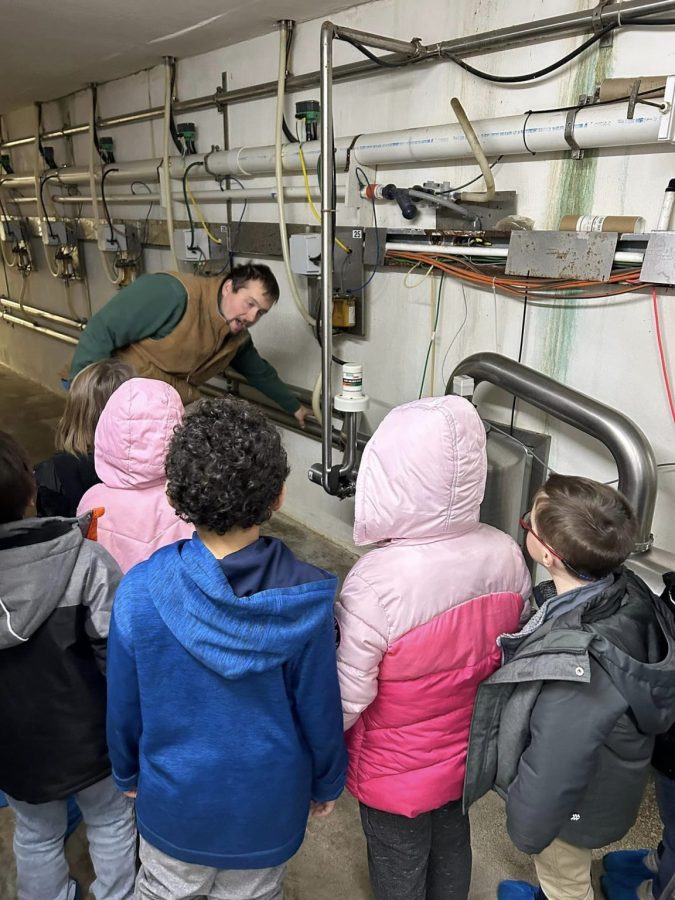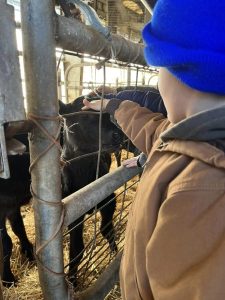Maine Teacher Connecting to Dairy Farming Through Adopt a Cow Program

Dairy farmers rely on a wide range of skills on a daily basis, but especially math and science. Lacey Todd, a fifth-grade science teacher at Mountain Valley Middle School in Maine, has been weaving dairy farming and agriculture into her science and ecosystems curriculum through Discover Dairy’s Adopt a Cow program.
“I was at a workshop and the Adopt a Cow program came up in conversation. I thought it sounded pretty cool to do with my fifth-graders, because I teach science at the middle school level. We’re the lowest grade here, so I have pets in my classroom and things like that,” Lacey shared. “This seemed like it would be a nice tie-in to some of the work we do with some of the other animals and with the ecosystems.”
Many of her students live in poverty and aren’t familiar with dairy farms, but Lacey says agriculture careers are a very viable possibility.
“It’s a rural area. We have a high poverty rate, and we’re a title one school. We’re surrounded by a lot of places that were formerly farmland,” she said. “This is a new thing for a lot of the kids, but it’s not out of the realm of possibilities for professions they could end up choosing.”
After signing up for the Adopt a Cow program and being paired with a calf from a dairy farm, Lacey and her students were excited to find out that their calf lived only about 40 minutes away from them. This helped them realize the local connections agriculture has in their community.
“When they found out the dairy farm was not only in our state, but only about 40 minutes away and right on the way to the area they would go shopping, they were so excited. That first day was so exciting when they found out which farm we had been paired with and when we saw those initial pictures of our calf,” she added.
With regular photo updates, videos, dairy-themed activities, and lessons that help teachers make STEM connections, Lacey has been able to connect the Adopt a Cow program directly to her curriculum and units. For example, her students used the growth chart that is provided through the program to develop their math and data collection skills by predicting how big their calf would grow.

“They’ve enjoyed the growth chart. We had a lot of really interesting predictions. We had a wall with our calf’s actual height and weight along with the updates as they came in. We compared that with the kids’ predictions, so they were kind of collecting data as it came through. That was important,” Lacey said.
Within her ecosystems unit, Lacey says they typically look at native species, including animals, plants, and fungi. She helps students consider how they are connected within food webs and how humans fit into the local ecosystem.
“At that point, we begin talking about food sources. Which things are naturally growing and living here in Maine, and which do we specifically plant, raise or grow? Cows are brought into that conversation,” Lacey explained. “They start making connections between the agriculture component of what actually needs to happen for a cow to be sustained for a lifetime. What are they eating? How much water are they drinking? They think about how much water a cow consumes over its lifetime, not just in what it drinks but also in the feed that is prepared for it. They’re developing this appreciation for every glass of milk they drink, including how much water has gone into it.”
Lacey even used some of Discover Dairy’s animal health lessons, which are available at no cost through the program, to help share what a calf needs in order to grow and be healthy. One of the bonus activities provided through the Adopt a Cow/Discover Dairy program was an activity for making ice cream, which connected to some of her science curriculum.
“That activity was queued up when we worked on mixtures, solutions and chemical changes. We tied it into that,” Lacey added. “I’ve been picking away at some of the Discover Dairy lessons, and I hope to do more of them this year in depth.”
As a Discover Dairy participant, Lacey was able to apply for a Farm Tour Field Trip Grant. Her classroom was awarded the grant, which allowed them to tour a dairy farm in their community and see the operation in action. Lacey says these experiences have helped her students realize that agriculture could be a potential career option in the future and is an important part of the fabric of their state.
“Agriculture is really specific and special to our state, and I think it has kind of been lost over the last 20 to 50 years. I wanted them to learn that agriculture is an industry that still exists and is something students can get involved with,” Lacey said. “Having that knowledge about these career opportunities, developing the appreciation for where their food comes from, and seeing how technology has found its way into this profession, those pieces are all very important to students.”
– credit to discoverdairy.com



